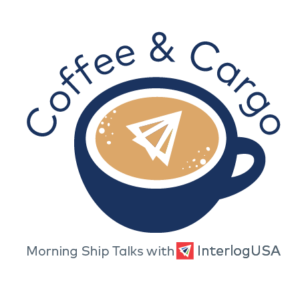Competitive Edge
Headlines
- The Port of Long Beach had a historical moment last week. The port welcomed Pasha Hawaii’s MV George III which became the first container ship powered by liquified natural gas to refuel on the U.S. West Coast.
- Earlier in the month, Air Canada announced the acquisition of two factory-built 767 freighters from Boeing. This move comes as the Canadian airline reaffirms its strategy of fully realizing a stand-alone freighter division to its operations.
Courtesy: American Journal of Transportation ; FreightWaves
UPDATE: U.S./Canada Ports – Number of Vessels at Anchor as of 08-23-22
- Savannah: 43 Vessels at Anchor (+7)
- Vancouver: 28 Vessels at Anchor (+4)
- Houston: 26 Vessels at Anchor (-7)
- New York/Newark: 14 Vessels at Anchor (-2)
- San Francisco/Oakland: 11 Vessels at Anchor (+5)
- Los Angeles/Long Beach: 8 Vessels at Anchor (-3)
- Charleston: 0 Vessels at Anchor (0)
Note: This count does not include vessels moored and being unloaded at port docks. Colored numbers in parentheses represents the change from last week over.
Courtesy: MarineTraffic
IMPORT: Asia to North America (TPEB)
Recent Developments:
- While rates continue a downward trend, U.S. port congestion and intermodal delays remain heavy players to unreliable scheduling.
- Contract negotiations between the International Longshore and Warehouse Union (ILWU) and Pacific Maritime Association (PMA) remain active. The existing labor contract between the two parties expired July 1.
- Both the ILWU and PMA have commented neither is planning on striking or shutting down operations amid ongoing talks. The two parties state their confidence that there will be no disruptions at USWC ports.
- Sources close to the talks speculate a deal will be reached by September. However, there has been no official comment or release from either party that confirms this is true.
Rates: Spot rates from Asia to the U.S. coasts continue to decrease as demand from shippers has softened (in large part to over-ordering earlier in the year). The traditional cycle of peak season remains delayed as shipper demand stays relatively low.
Space: Space is generally open at this time.
Capacity: Capacity has tightened in pockets. Shippers continue to divert cargo to the USEC due to fears of disruptions at West Coast ports from ongoing labor talks.
Equipment: Some inland terminals are reaching max capacity with inventory. Intermodal systems remain stressed with congestion and truck and chassis deficits.
- North American chassis manufacturers have ran into production delays in 2022 (for the second consecutive year), reports indicate. This stems from difficulties in sourcing raw components and retaining factory workers.
TIPS: Book at least 2-3 weeks prior to ready date. Strongly consider premium services and, if cargo is ready now, make plans to move as soon as possible with the current openings in space and fallen rates. When possible, shippers with fixed-rate contacts should take advantage of these softened rates on the floating market.
For more on the TPEB import lane, sign-up to our Interlog Insights Weekly Newsletter! In our August editions, Interlog’s experts are dissecting why shippers are rerouting to the East and Gulf coasts and how this decision has subsequently led to a shift in our country’s port congestion.
IMPORT: Europe to North America (TAWB)
Recent Developments:
- Northern European hubs remain critically congested. Labor-related tensions continue to pose disruptions to German, Dutch, and British ports.
- Operations at Britain’s largest container port, Felixstowe, has been brought to a standstill as more than 1,900 port workers are engaging in an eight-day strike, which began August 21, for inflation-busting pay increases, reports indicate.
- USWC ports have seen alleviated congestion and improvements to vessel waiting times—yet still a far cry from pre-pandemic standards.
- There are no disruptions directly related to ongoing WC labor talks.
- On the USEC, both ports of New York/Newark and Savannah remain having a significant number of backlogged vessels at anchor off their respective shores.
- The Port of Houston, on the U.S. Gulf Coast, is also grappling with vessel congestion.
Rates: Rates remain elevated, but consistent, for the foreseeable future. Higher fuel costs are contributing to rate increases.
Space: Space remains critical to USEC routings. Meanwhile, there’s been slight openings in space for USWC direct routings.
Capacity: Capacity for both North Europe and Mediterranean services remain gripped.
Equipment: Equipment at European seaports is not as readily available as it has been for the past few months. Inland terminals in Europe are also still reporting equipment shortages. On the U.S. side, truck and chassis availability remain concerning, especially with the latter.
TIPS: Book 5 or more weeks prior to ready date. Shippers are strongly advised to use premium service for no-roll options and improved reliability for their cargo.
For more on the labor strike at Britain’s largest port, Felixstowe, sign-up to our Interlog Insights Weekly Newsletter! Our August editions are also including follow ups on any developments that occur regarding this subject in closer detail.
EXPORT: North America to Asia
Recent Developments:
- For the USEC, port congestion remains an issue for Savannah and New York/Newark.
- Diminished schedule integrity continues to challenge post earliest return dates.
- Vessel arrivals remain smooth for USWC POLs.
Rates: So far, no GRIs announced for September.
Capacity: Available capacity remains fluid for USWC POLs.
Equipment: Truck, container, and chassis availability remains dire and has significantly contributed to congestion of the intermodal system and IPI origins. Standard equipment at ports remains available unless carriers advise otherwise.
TIPS: Book 4 to 5 weeks prior to time of departure to secure necessary equipment and vessel space.
Freight News
On Sunday the Port of Felixstowe started an eight day strike
As expected, the Port of Felixstowe started the eight day strike on Sunday. The main reason for the strike is demand from workers wanting pay increases due to inflation.
Workers recently rejected an average 8% pay offer from the Felixstowe Dock and Railway Company, because the wage offered was lower than the rate of inflation, CNBC reports. Reports show that workers are demanding a 10% pay increase. Over 1,900 members of the union are striking including, crane drivers, tugboat operators and stevedores (which is someone employed at a dock to load and unload cargo from ships).
Nearly 50% of the United Kingdom’s container trade is processed at the Port of Felixstowe.
Felixstowe is not the only port in Europe that has strikes occurring. Ports in Germany have been dealing with work stoppages and strikes. However, just today German port employers and the union representing the dockworkers reached an agreement after 10 rounds of negotiations. While full details are not out just yet, it has been reported that employees at the Germany’s North Sea ports will receive significant increases in pay packages, the Journal of Commerce reports.
We also discuss this in this month’s Interlog Insights newsletter if you would like to sign up to read more about this topic. Additionally, we will continue to keep you updated on any changes throughout these strikes.
Shanghai saw volumes hit records in July – demonstrating recovery months after major lockdowns
As I’m sure you all remember back this spring, the lockdowns in Shanghai caused some hurdles in the supply chain. Well, fast forward to a few months later and volumes in Shanghai have soared.
In July, volumes in Shanghai hit 4.3 million twenty-foot equivalent units (TEUS), which set a new July throughput record for the port, the Journal of Commerce reported. These numbers are demonstrating recovery in Shanghai, months after lockdowns occurred.
One of the contributing factors some say to these record numbers, is the direct reflection on companies having to partially or completely close their manufacturing operations for several months, then as things began to open in Shanghai, companies had to rush and play catch up. Though many expect things to taper off a bit in September and beyond.
Sign up for next month's webinar!

Make sure you sign up for our next webinar that is taking place on Wednesday September 21st where we will be discussing current and exciting topics in the freight industry.
If you have never joined our Coffee and Cargo webinar click the "Watch now" button to view our most recent webinar.
We look forward to seeing you there!
Sign up for our
industry answers
Our team works to provide valuable, unique, and relevant content to assist you in finding solutions. Sign up now.


